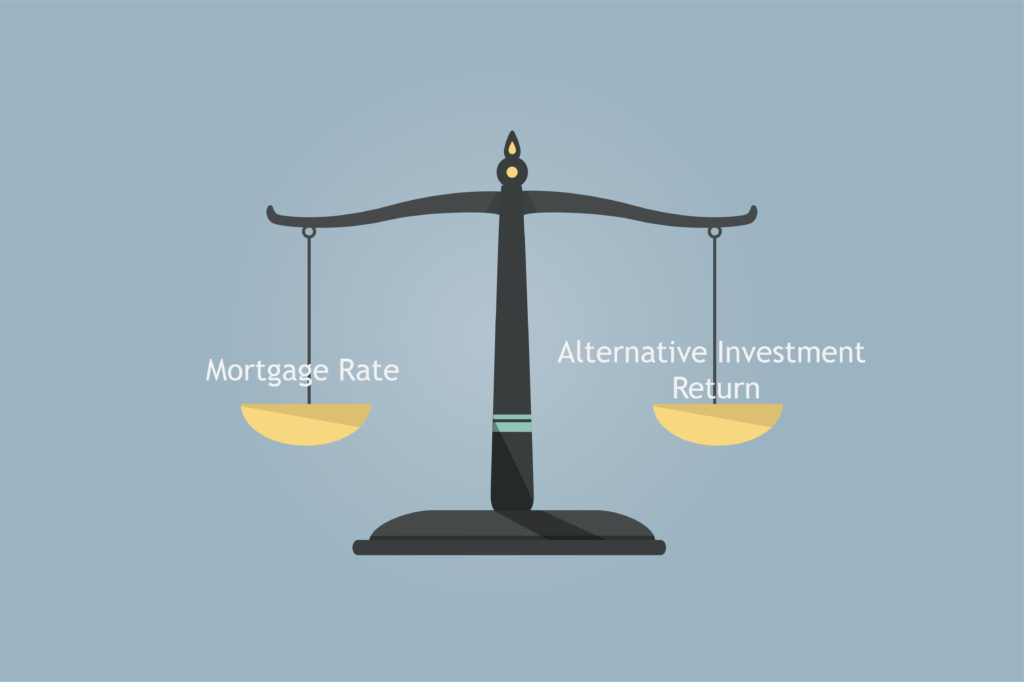If you are looking to buy your first home or an investment property, congratulations. Owning a property is a major milestone in life and it can be financially rewarding. Buying a property is also a challenging process with many important yet difficult decisions. One of the most frequently asked questions is “should I buy a house with cash or a mortgage?”
The answer to this question is not as simple as it seems. Some homeowners take out mortgages because they need additional capital. However, many wealthy investors who can afford a cash purchase still use mortgages for good financial reasons. Each option has its own financial implications and a well-deliberated choice can make a big difference in your finances.
Buying a house with cash

When you buy a house with all cash, you own 100% of the home with no additional interest cost or debt. Along with the great satisfaction of owning your home, buying a property with cash has additional benefits.
Faster closing process
Real estate transactions take a long time to complete. Applying for a mortgage is the most time-consuming step. Mortgage providers conduct a thorough check on your finances before lending you money. Cash buyers can avoid this draining process. Once the buyer and seller agree on a price, they can complete the transaction in a week.
Fast turnaround time matters if you need to move into the home quickly. If you are investing in a rental property, you might also want to close the transaction quickly so you can list the property during peak rental months.
Bargaining power
The real estate market can be very competitive, especially in big cities. Good properties sell fast. Cash buyers have additional negotiation power that makes them more appealing to the sellers. With ready cash, you can win over the seller and potentially get a better deal than a mortgage buyer would. There are two reasons cash offers are attractive. First, sellers know how long real estate transactions can take with mortgage applications. If they need the money straight away, sellers often choose cash buyers even if it means selling their properties at a discount.
Second, offers from mortgage buyers can fall through at any point until the mortgage is approved. If a buyer’s mortgage is denied, the offer is then off the table. The seller must find another buyer and start the process again. Cash offers are much more dependable from the seller’s perspective.
No monthly interest payment
The interest on a mortgage can be significant. As an example, with a $200,000 mortgage and a 6% interest rate, the buyer will pay an additional $185,000 in interest over 30 years. Cash buyers, on the other hand, can avoid paying this interest and have no monthly financial burden.
Buying a home with mortgages
Most homeowners in the United States purchase their homes with mortgages. For many people, mortgages allow them to buy a home without saving up for thirty years first. Even when an investor has enough cash, a mortgage might still be a good way to finance a property with additional benefits.
Financial leverage
Financial leverage is the mechanism that allows investors to control larger investment positions than their cash can afford. Margin loans provided by your broker are a common example of leveraging. Most people don’t realize that mortgages also use financial leverage. When you purchase a house with a mortgage, you pay only a fraction of the price and borrow the rest from the mortgage provider.
The significance of financial leverage is that it can help you build wealth faster. For example, a couple just bought a house for $300k with a $60K down payment and a $240k mortgage. The mortgage helps the couple buy a house five times their investment.
The financial leverage amplifies any return and loss on this property. If the property price goes up by $20k, the couple will have a $20k gain on their $60k investment. This is a 33% return ($20k/$60k). However, if the couple had bought the house in cash, they would still have the same gain but the return on their investment would only be 6.67% ($20k/$300k). Mortgages also amplify losses in a similar fashion. The leverage effect is the reason some wealthy investors still use mortgages.
Relatively low interest rates
Compared to personal loans and margin loans, mortgages have relatively low interest rates. For example, the average rate for a margin loan of $300k or more is 7.49%. The interest rate on a mortgage is much lower at around 5%.
We are currently in a low rate environment. The Fed’s dovish monetary policy has kept the interest rate low. New mortgage applicants can lock in this low rate for a long time even if the interest rate rises in the future.
There is an additional tax benefit that can help further reduce the cost of mortgages. If you have a mortgage on your primary or secondary residence, you might be qualified to deduct your interest payments from your tax return. This means you can save 10 to 37% in taxes on your mortgage interest payments, depending on your income bracket.
Mortgage V.S. cash – it is an investment decision
No matter if you are buying a home or an investment property, financing your purchase is ultimately an investment decision.
Consider the opportunity cost
When you buy a property in cash, you own your home outright and it is comforting to know that you have no additional debt obligation. However, investors rarely consider the opportunity cost of buying a house with cash. By putting your money in your property, you give up on the potential investment return the cash could have generated in the market.
So here is the tradeoff. When you buy a house with cash, you avoid mortgage interest payments but will miss out on the investment return from investing your money. When you use a mortgage, you can invest your cash but have to pay interest on your mortgage.

Ultimately, the decision to buy a house with either cash or a mortgage can be boiled down to a comparison between the opportunity cost and mortgage interest. For example, if your mortgage rate is 4% and your average investment return is 7%, you might be better off using a mortgage and investing your money. However, there is a risk involved in this strategy. Because the market return is not fixed like the mortgage rate, your investment profit might not always cover the mortgage cost.
Factors that affect your alternative investment return
Comparing your expected investment return and the mortgage rate is not straightforward. While you can lock in the mortgage rate, it is difficult to predict your future investment return. There are many factors that you must consider to estimate your potential profit.
Market environment
The market environment heavily affects your investment outlook. A bull market can help investors generate great returns but a bear market is bad news. The business cycle, Fed’s policies, and general sentiment can all affect your profit. Thus, it is important to analyze the market outlook for both the near-term and the long term.
Your historical investment return
Even in the same market, each investor has a different return. It depends on your investment strategies and skills. To gain a better understanding of your potential return, you should calculate the average yield of your existing investments in the past. While past performance doesn’t guarantee future profits, it can be a reference point for the return you can expect in the future.
Quantitative Easing – a practical example
To help illustrate the analysis process, let’s go through an example.
After the 2008 recession, the Federal Reserve implemented Quantitative Easing (QE) and kept the interest rate low. The impact of QE is twofold. First, the lowered interest rate led to low mortgage rates. The table below shows the sustained level of low mortgage rates after the financial crisis. Secondly, Quantitative Easing also stimulated the stock market to give investors record-breaking returns.
Consequently, buying a property with a mortgage after 2008 allowed the buyer to gain higher return in the equity market while paying low interest on their mortgages. The chart below shows the annual S&P returns and the average mortgage interest rates for 2001 and 2009. When the S&P return goes above the mortgage rate, the buyer benefits from using a mortgage. What we can learn from this chart is that post-2008, it was more beneficial to buy properties with mortgages and invest cash in the equity market.
Risks
Hindsight is 20/20. Using a mortgage and investing your cash also comes with a risk. While mortgage payments are fixed, investment returns can change with the market. Thus, there is a risk that investors might receive a loss on their investment while paying interests on their mortgages.
Mixing it up
As you have seen, the decision to buy a home with cash or a mortgage is more interesting than it first appears. Your decision depends on your expected portfolio return and the mortgage rate. While it can be overwhelming to analyze these factors, investors can always diversify. If there are investment opportunities that you want to pursue, you can take out a mortgage and invest the cash. Mortgages are pre-payable. If the market condition changes, you can always prepay your mortgage and reduce your debt. This gives you more flexibility in your strategy.
Conclusion
Buying a home is a complex process and often an emotional one. How you finance your purchase should be based on a rational comparison between the alternative investment return and the mortgage rate. I hope this article helps illuminate the inconspicuous considerations in deciding how to finance your home and help you make a better decision!




